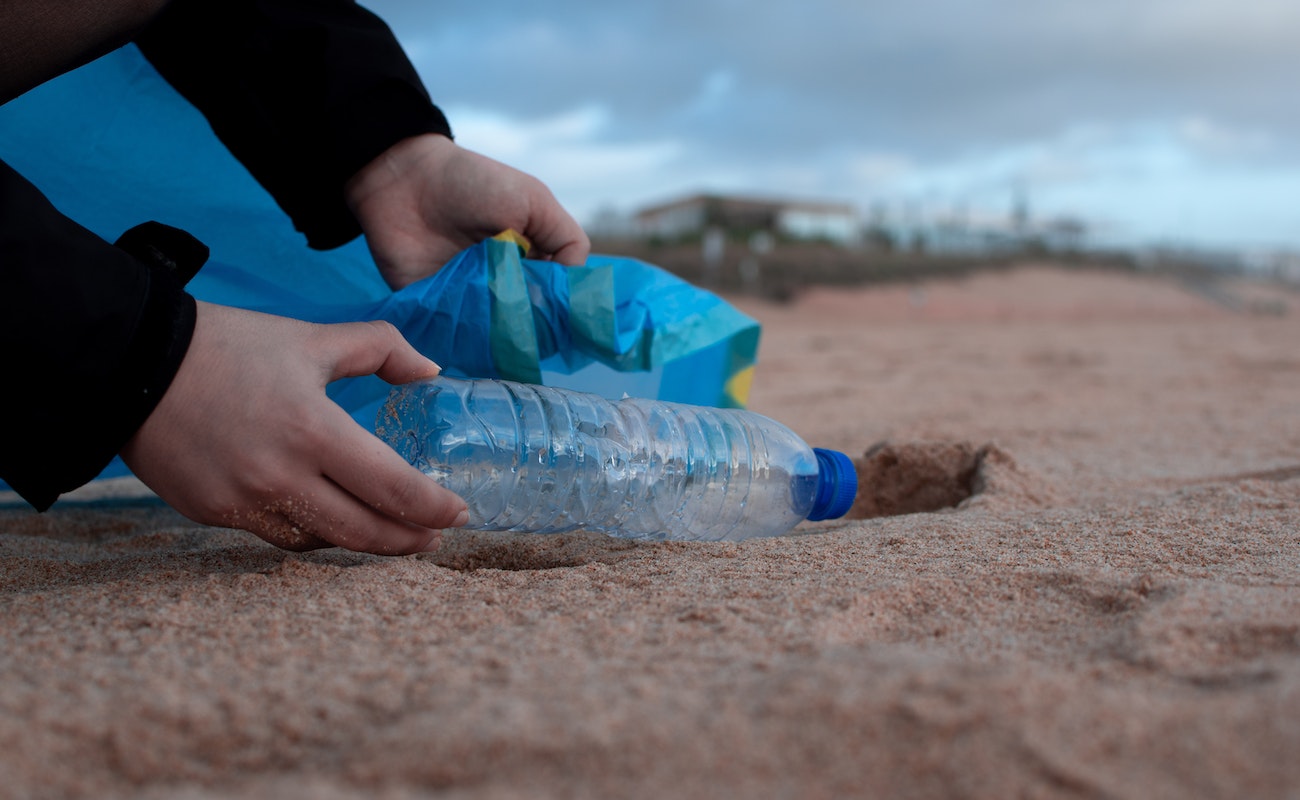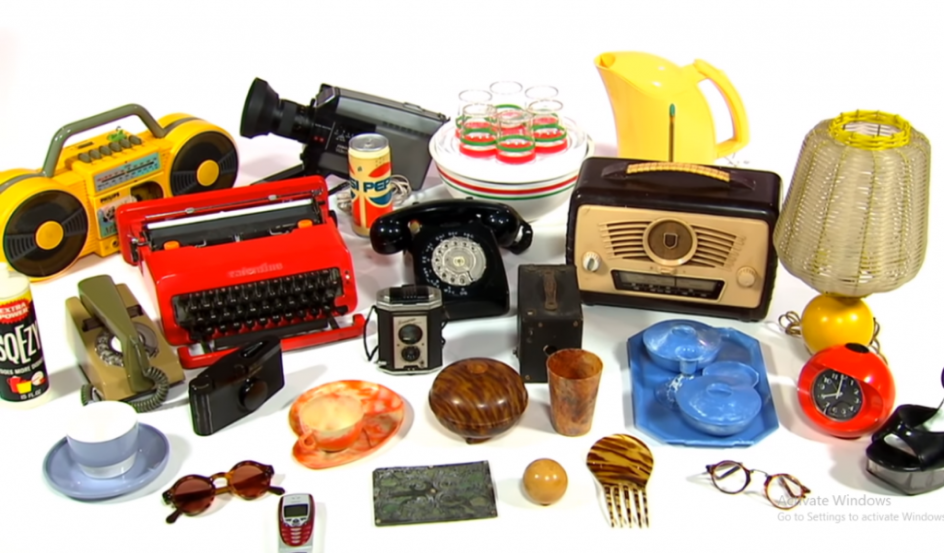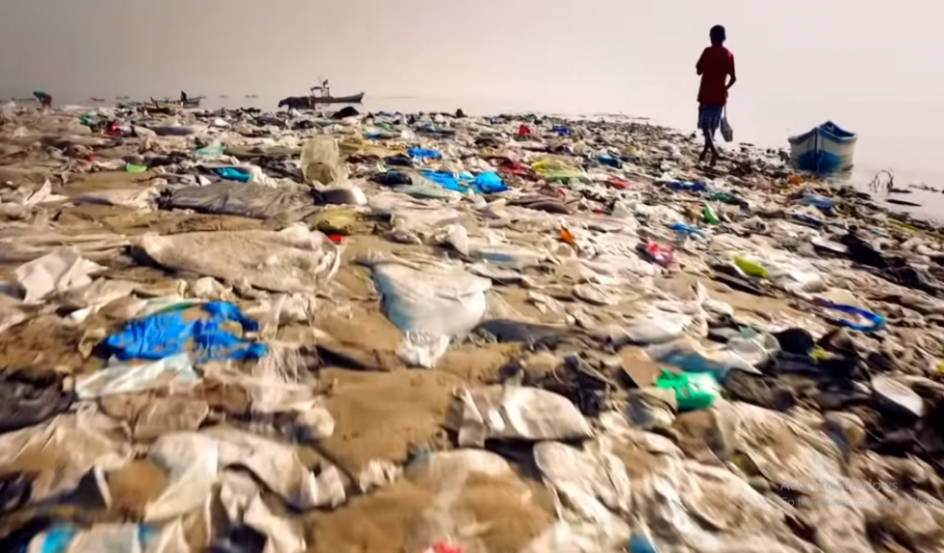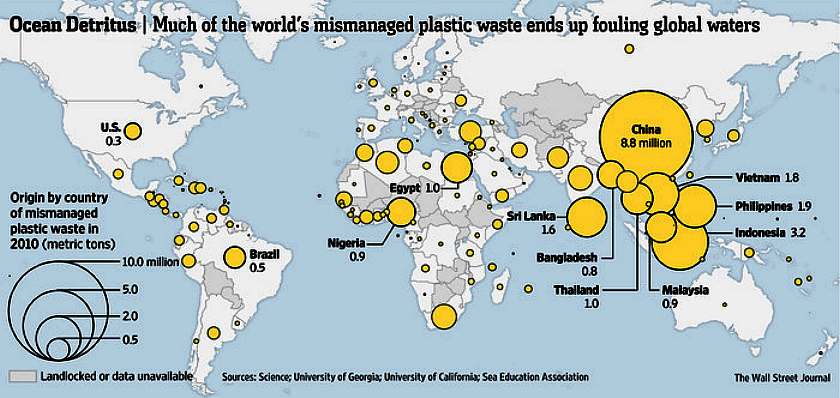Each Student to World online course includes both text-based and video-based curriculum options. Both versions have the same content, so individual students can choose the method that works best for them.
Everyday Plastics

How much plastic do you see from where you sit right now?
Every day, people all over the world use plastic. Chances are, there is plastic in the device you are using to see this screen. Take a minute to look around and take stock of all the plastic you see.
Plastic is a synthetic polymer, which means it is created by people and is made up of similar molecules. Plastic is flexible, strong, and lightweight, which makes it easier to use than other, more natural, materials.
The history of plastic
Take a look at the video below for a brief history of plastics:

Plastic was invented in the mid-1800s. It was the first material that could be used in the same ways as those found in nature, like wood, ivory, metal, stone and bone. People did not need to worry about running out of plastic like they did about other materials.

In the 1940s and 50s, plastic was used in most items that had been made out of natural materials before. It took the place of steel in cars, paper and glass in delivery, and wood in furniture. It was a part of everyday life throughout the entire world.

In the 1960s, people first started reporting plastic bits in the ocean. The health of the ocean, fish, and the coral reef were in danger. Plastic pieces were found in the bellies of many sea animals. Large landfills in the middle of the oceans were sending toxins into the waters.
About This Course
This course was created by our unique, youth-led global internship program. Visit the course page to view learning objectives, standards alignments, content formats, and more.
Watch a Video of Module 1 Part 1
As part of Global Nomads Group’s commitment to accessibility, all Student to World video courses include American Sign Language interpretation and Closed Captioning in English and Arabic.
Key Vocabulary
Bioplastics. n. Plastic made from plant materials rather than oil.
Landfill. n. A place where garbage is buried.
Synthetic polymer. An artificial substance made from many smaller molecules (= groups of combined atoms).
Register
Teachers, Educators, & Leaders
Create an account and invite students or youth participants.
Students
If your teacher or group facilitator gave you a code.
Independent Learners
Take a course on your own.
Already have an account?
Grecia, Youth from Peru
“They came to me, probably at a family lunch. Our favorite drink, our very Peruvian Inca Kola, contained inside three huge 3L bottles. Plastic bottles that would end up in the sea, killing the biodiversity of which we are so proud, damaging our ocean. I couldn’t allow it. I imagined the bottles that I found lying in the beautiful dunes that characterize my city. I had to do something. At that time I started to worry about my health, and wanted to get weights to exercise. So I had a wonderful idea, to turn those huge bottles into weights. And so I did, I filled them with sand and built a set of weights that serve me to this day.”
Grecia, Youth from Peru
“They came to me, probably at a family lunch. Our favorite drink, our very Peruvian Inca Kola, contained inside three huge 3L bottles. Plastic bottles that would end up in the sea, killing the biodiversity of which we are so proud, damaging our ocean. I couldn’t allow it. I imagined the bottles that I found lying in the beautiful dunes that characterize my city. I had to do something. At that time I started to worry about my health, and wanted to get weights to exercise. So I had a wonderful idea, to turn those huge bottles into weights. And so I did, I filled them with sand and built a set of weights that serve me to this day.”
Plastic and the environment
Many plastic products are designed for one-time use and plastic is not biodegradable, meaning it does not decompose. In other words, plastic lasts forever. With so many people using plastic items once and then throwing them away, the material to go somewhere. Unfortunately, a lot of plastic ends up in the ocean.
People are concerned about the effect of plastic waste on oceans and the environment, so many have participated in recycling efforts. Even though communities participate in recycling programs, plastic still ends up in landfills. The largest current landfill sits in the middle of the Pacific Ocean.
Living without plastic would change our lives dramatically. We are used to relying on products that have plastic in them, like:
- cars
- phones
- computers
- medical supplies
- water bags
- straws
- bags
Plastics around the world
In most parts of the world, people use plastic. Each year, people produce nearly 300 million tons of plastic. The map below shows how much plastic ends up in oceans around the world.

Much of the world’s mismanaged plastic waste ends up fouling global waters
Young people are leading the way in pushing for less plastic use. The challenge of reducing plastic use is not so easy. Think about all the plastic items in your life.
Would it be easy for you to stop using plastic?
If your answer is no, you’re not alone. Now that you understand the history and common use of plastic, you’ll explore the specific items that you and other young people around the world use every day.
You’re ready to explore…
Now that you’ve learned about the history of plastic usage and the dangers of plastic waste, you’re ready to explore new perspectives about plastic from around the world. Imagine you’re traveling to other countries to hear what other young people have to say about plastic in their lives. Their stories and more are waiting for you on the next page.
To explore stories and resources, register for this course!
Register
Teachers, Educators, & Leaders
Create an account and invite students or youth participants.
Students
If your teacher or group facilitator gave you a code.
Independent Learners
Take a course on your own.
Already have an account?
About This Course
This course was created by our unique, youth-led global internship program. Visit the course page to view learning objectives, standards alignments, content formats, and more.
Watch a Video of Module 1 Part 1
As part of Global Nomads Group’s commitment to accessibility, all Student to World video courses include American Sign Language interpretation and Closed Captioning in English and Arabic.
Key Vocabulary
Bioplastics. n. Plastic made from plant materials rather than oil.
Landfill. n. A place where garbage is buried.
Synthetic polymer. An artificial substance made from many smaller molecules (= groups of combined atoms).
Register
Teachers, Educators, & Leaders
Create an account and invite students or youth participants.
Students
If your teacher or group facilitator gave you a code.
Independent Learners
Take a course on your own.

